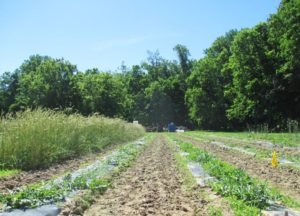Watermelon production is threatened by Fusarium wilt, a widely distributed soilborne disease that can cause yield losses up to 100%. Currently, there are no watermelon varieties that are completely resistant to all races of Fusarium wilt. One way to control the disease is through grafting. The grafted plant combines a watermelon cultivar with a squash rootstock that has resistance to Fusarium wilt. In a study conducted at Southwest Purdue Ag Center (SWPAC), we found grafted watermelons significantly reduced disease incidence, and more than doubled watermelon yield in a Fusarium wilt infected field (Figure 1).

Figure 1. Grafted Fascination plants were grown on the right bed, ungrafted plants were grown on the left bed. The field was naturally infested with Fusarium wilt.
In addition to controlling Fusarium wilt, grafted watermelons often show substantial advantages in early watermelon production due to cold tolerance from rootstocks. In a study conducted in Arizona, grafted watermelons that were transplanted in the field two months before soil temperatures reached 70 °F had twice as much yield as ungrafted watermelons grown in the same condition. At SWPAC, we also observed that grafted watermelons had a greater transplant establishment rate, and grew faster in the early season compared to ungrafted seedlings when they were grown under low soil temperature conditions.
Although grafted plants are highly effective in controlling Fusarium wilt and offer advantages in early season production, acceptance of this practice among watermelon growers is low in the U.S. This is primary because grafted transplants are 3-4 times more expensive than ungrafted watermelon seedlings. It is estimated that growing grafted watermelons can increase transplant cost more than $1,000 per acre. The increased cost was more than double the cost of soil fumigation, which growers often rely on to control Fusarium wilt.
One way to mitigate the transplant cost of grafted watermelons is through reduced plant populations since grafted plants are more vigorous than ungrafted plants. It has been estimated that growing grafted plants might reduce plant populations by 20-30% while achieving a similar yield per acre. But the assumption has not been approved yet. There are studies which show that grafted watermelons are sensitive to excessive nitrogen, and too much nitrogen early in the growing season may lead to flower abortion. To test those assumptions, we will evaluate the performance of grafted watermelons with reduced plant populations and a well-defined fertility management program in the upcoming season. Results from the trial will be reported in the latter issues of Vegetable Crops Hotline Newsletter.